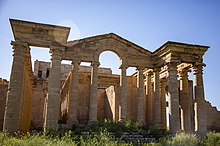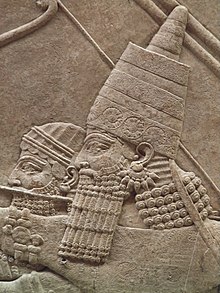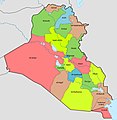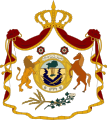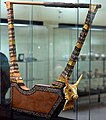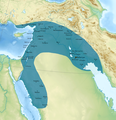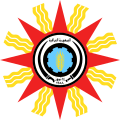Portal:Iraq
The Iraq PortalA view of Baghdad, Iraq
Iraq, officially the Republic of Iraq, is a country in West Asia and in the geopolitical region known as the Middle East. With a population of over 46 million, it is the 31st-most populous country. It is a federal parliamentary republic that consists of 19 governorates. The country is bordered by Turkey to the north, Iran to the east, the Persian Gulf and Kuwait to the southeast, Saudi Arabia to the south, Jordan to the southwest, and Syria to the west. The capital and largest city is Baghdad. The Iraqi people are diverse; mostly Arabs, as well as Kurds, Turkmen, Assyrians, Armenians, Yazidis, Mandaeans, Persians and Shabakis with similarly diverse geography and wildlife. Most Iraqis are Muslims – minority faiths include Christianity, Yazidism, Mandaeism, Yarsanism and Zoroastrianism. The official languages of Iraq are Arabic and Kurdish; others also recognized in specific regions are Turkish (Turkmen), Suret (Assyrian), and Armenian. Modern Iraq dates to 1920, when a Mandate was created by League of Nations. A British-backed monarchy was founded in 1921 under Faisal. The Hashemite kingdom gained independence from the UK in 1932. In 1958, the kingdom was overthrown and a republic was created. Iraq was ruled by the Ba'ath Party from 1968 to 2003, led by Al-Bakr and then by Saddam Hussein, as a one-party state. Iraq invaded Iran in 1980, sparking a war that ended as a stalemate in 1988. In 1990, Iraq invaded Kuwait, leading to a military campaign waged by a US-led international coalition that expelled Iraqi forces from Kuwait. An invasion launched by another US-led coalition as part of its "War on Terror" in 2003 resulted in the defeat of Ba'athists and Saddam's execution. Discontent with the de-Ba'athification policies of the Provisional Authority stirred up an anti-American insurgency, which escalated into a sectarian civil war. In 2005, a new constitution was adopted and multi-party parliamentary elections were held in Iraq. Withdrawal of US troops began in 2008, and the occupation officially ended in 2011. Continued repression and sectarian policies of Nouri al-Maliki's Shia government caused protests, after which a coalition of Ba'athist and Sunni militias took up arms during a campaign. The climax of the campaign was the North Iraq offensive by the ISID that marked its rapid territorial expansion, prompting the return of American troops to fight the war, which lasted until 2017. Iran has also intervened since 2014, expanding its influence through sectarian parties and Khomeinist militia groups, triggering widespread protests. (Full article...) Selected article -Hatra (/ˈhæ.trə/; Arabic: الحضر (Arabic pronunciation: [ˈħadˀ.ra] ; Syriac: ܚܛܪܐ) was an ancient city in Upper Mesopotamia located in present-day eastern Nineveh Governorate in northern Iraq. The ruins of the city lie 290 km (180 mi) northwest of Baghdad and 110 km (68 mi) southwest of Mosul. It is considered the richest archaeological site from the Parthian Empire known to date. Hatra was a strongly fortified caravan city and capital of the small Arab Kingdom of Hatra, located between the Roman and Parthian/Sasanian Empires. Hatra flourished in the 2nd century, and was destroyed and deserted in the 3rd century. Its impressive ruins were discovered in the 19th century. (Full article...)Selected picture
Shanidar Cave, where the remains of eight adults and two infant Neanderthals were found Did you know...
Selected biography -
Ashurbanipal (Neo-Assyrian cuneiform: Aššur-bāni-apli, meaning "Ashur is the creator of the heir") was the king of the Neo-Assyrian Empire from 669 BC to his death in 631. He is generally remembered as the last great king of Assyria. Ashurbanipal inherited the throne as the favored heir of his father Esarhaddon; his 38-year reign was among the longest of any Assyrian king. Though sometimes regarded as the apogee of ancient Assyria, his reign also marked the last time Assyrian armies waged war throughout the ancient Near East and the beginning of the end of Assyrian dominion over the region. (Full article...)
General imagesThe following are images from various Iraq-related articles on Wikipedia.
ListsTopicsCategoriesRelated portalsReligions in Iraq Arab states WikiProjectsThings you can do
Associated WikimediaThe following Wikimedia Foundation sister projects provide more on this subject:
Discover Wikipedia using portals | ||||||||
- Portals with triaged subpages from September 2020
- All portals with triaged subpages
- All portals
- Portals with no named maintainer
- Pages with Arabic IPA
- Random portal component with more available subpages than specified max
- Random portal component with 11–15 available image subpages
- Iraq
- Iraq portal
- Asian portals
- Middle Eastern portals
- Portals by country




